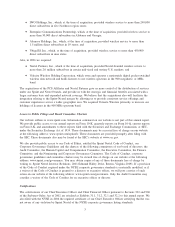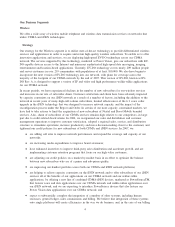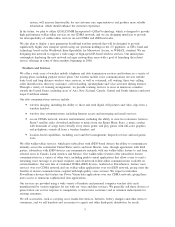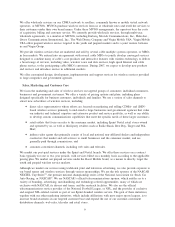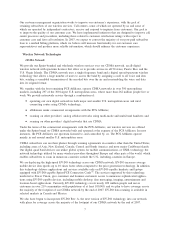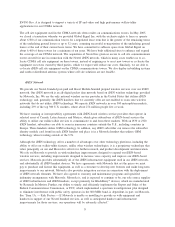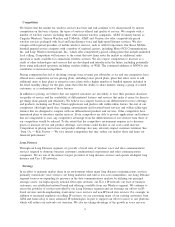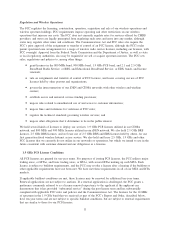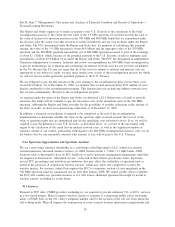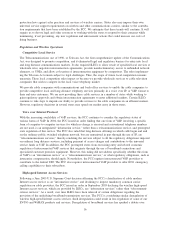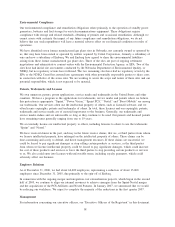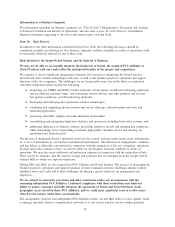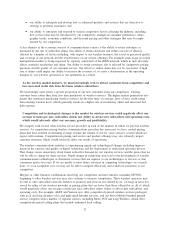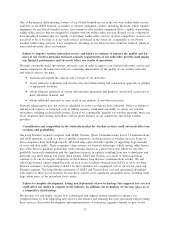Sprint - Nextel 2006 Annual Report Download - page 15
Download and view the complete annual report
Please find page 15 of the 2006 Sprint - Nextel annual report below. You can navigate through the pages in the report by either clicking on the pages listed below, or by using the keyword search tool below to find specific information within the annual report.800 MHz Band Spectrum Reconfiguration
In recent years, the operations of a number of public safety communications systems in the 800 MHz block of
spectrum have experienced interference that is believed to be a result of the operations of CMRS providers
operating on adjacent frequencies in the same geographic area.
In 2001, Nextel filed a proposal with the FCC that would result in a more efficient use of spectrum through
the reconfiguration of spectrum licenses and spectrum allocations in the 700, 800 and 900 MHz bands and,
thereby, resolve many of these interference problems. In 2004, following a rulemaking to consider proposals to
solve the public safety interference issue, the FCC adopted a Report and Order that included new rules
regarding interference in the 800 MHz band and a comprehensive plan to reconfigure the 800 MHz band. In
February 2005, Nextel accepted the Report and Order, which was necessary before the order became effective,
because the Report and Order required Nextel to undertake a number of obligations and accept modifications
to its FCC licenses. We assumed these obligations when we merged with Nextel in August 2005.
The Report and Order provides for the exchange of a portion of our FCC spectrum licenses, which the FCC is
implementing through modifications to these licenses. Specifically, the Report and Order modified a number
of FCC licenses in the 800 MHz band, including many of our licenses, and implemented rules to reconfigure
spectrum in the 800 MHz band in a 36-month phased transition process. It also obligated us to surrender all of
our holdings in the 700 MHz spectrum band and certain portions of our holdings in the 800 MHz spectrum
band, and to fund the cost incurred by public safety systems and other incumbent licensees to reconfigure the
800 MHz spectrum band. Under the Report and Order, we received licenses for 10 MHz of nationwide
spectrum in the 1.9 GHz band, but we are required to relocate and reimburse the incumbent licensees in this
band for their costs of relocation to another band designated by the FCC.
The reconfiguration process is to be completed by geographic region and involves reaching agreement and
coordinating numerous processes with the incumbent licensees in that region, as well as vendors and
contractors that will be performing much of the reconfiguration. We are permitted to continue to use the
spectrum in the 800 MHz band that was surrendered under the Report and Order during the reconfiguration
process; however, as part of the reconfiguration process in most regions, we must cease using portions of the
surrendered 800 MHz spectrum before we are able to commence use of replacement 800 MHz spectrum,
which has contributed to the capacity constraints experienced on our iDEN network, particularly in some of
our more capacity constrained markets, and has impacted the performance of our iDEN network in the affected
markets.
We believe we have substantially met the first progress milestone established by the Report and Order by
retuning all incumbent licensees on the first 120 800 MHz channels in at least 26 FCC-defined regions, and by
initiating retuning negotiations with all licensees on the last 120 800 MHz channels in those 26 regions, within
an 18-month period which began on June 27, 2005. The Report and Order required us to complete these
actions in at least 20 of 55 FCC-defined regions within the 18-month period. We have reported our progress to
the FCC.
The Report and Order requires us to complete the 800 MHz band reconfiguration within a 36-month period,
ending in June 2008, subject to certain exceptions particularly with respect to markets that border Mexico and
Canada, and to complete the 1.9 GHz band reconfiguration within a 31.5-month period, ending in September
2007. If, as a result of events within our control, we fail to complete our reconfiguration responsibilities within
the designated time periods for either the 800 MHz or 1.9 GHz reconfigurations, the FCC could take actions
against us to enforce the Report and Order. These actions could have adverse operating or financial impacts on
us, some of which could be material. We believe, based on our experiences to date, that neither the 800 MHz
reconfiguration nor the 1.9 GHz reconfiguration will be completed within the applicable FCC designated time
periods due primarily to circumstances largely outside of our control. We do not believe at this time that the
impact from this delay will be material to our results of operations or financial condition, although there can
be no assurances. Recognizing the current limitations in the reconfiguration process, both Sprint Nextel and
the public safety community jointly filed a letter with the FCC on February 15, 2007, requesting that the FCC
direct the independent Transition Administrator, or TA, through working closely with the affected parties, to
develop a schedule and benchmarks for completing the second phase of the 800 MHz reconfiguration. See
13


